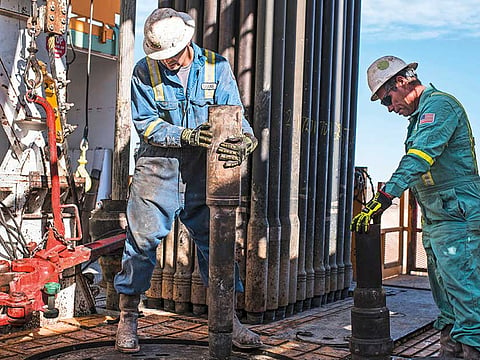It’ll take oil above $50 for shale boom, oil sands to pay off
Shale oil producers ‘are creatures of the capital markets’, Chanos told Bloomberg TV

Shale drillers and oil sands producers have posted some healthy profits so far this year, but it’ll take oil consistently above $50 (Dh183.64) a barrel for their investments to pay off in the long run.
That’s the conclusion of a Moody’s Investors Service study of 37 exploration and production companies in the US and Canada released on Thursday. It’s also why legendary hedge fund manager Jim Chanos, who’s shorting shale driller Continental Resources Inc., says independent explorers have been a bad deal for shareholders.
Shale oil producers “are creatures of the capital markets”, Chanos told Bloomberg TV’s Julia Chatterley, Joe Weisenthal and Scarlet Fu. “Because the wells deplete so quickly, they constantly need to raise money to replace the assets.”
Producers in the US and Canada have made dramatic efforts to cut costs since the collapse of oil prices three years ago, with many delivering higher dividends to investors this year. But with limited wiggle room to reduce costs further, any improvement in their ability to sustain healthy returns will have to come from commodity prices, Moody’s analysts Sreedhar Kona and Steven Wood said in the report.
The two analysts used a measure of how efficiently cash is generated to cover the costs of leasing drilling rights and boring wells, and still have enough left over to invest in future projects.
“Companies will be able to demonstrate meaningful capital efficiency, measured by the leveraged full cycle ratio, only if the West Texas Intermediate oil price is above $50 per barrel and the Henry Hub natural gas price is at least $3 per million British thermal units,” they said.
With a few notable exceptions such as Appalachian explorers Antero Resources Corp. and Range Resources Corp., as well as Canadian shale gas producer Seven Generations Energy Ltd., the ratio for the vast majority was way below a level Moody’s considers healthy.
Interestingly, the three best performers are focused on liquids-rich gas plays: the Marcellus and Utica formations in the northeastern US and the Montney shale in Alberta. Antero and Seven Generations have seen their cash flow from operations surge over the past few years, according to data compiled by Bloomberg.
Producers’ leveraged full cycle ratio needs to be significantly above 1 for explorers to earn a meaningful return on their investment, the Moody’s analysts said. The average for the 37 explorers was 0.59 last year, according to the study. The ratios for the top three performers were above 1.5. Antero’s 2.19 ratio tops the list.
Among the lowest ranking were Apache Corp. and Devon Energy Corp., with ratios below 0.05, according to the report.
Sign up for the Daily Briefing
Get the latest news and updates straight to your inbox



